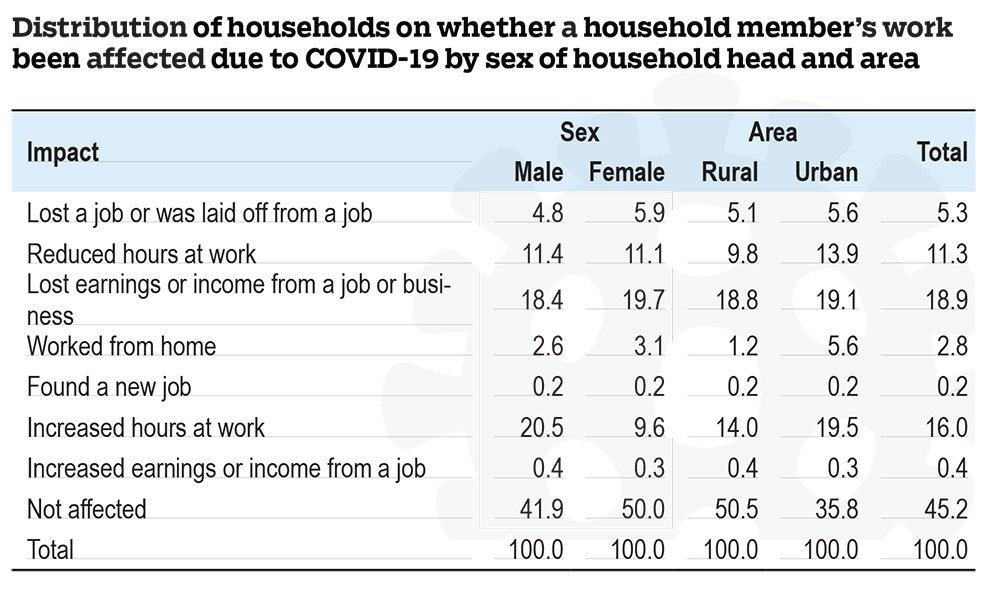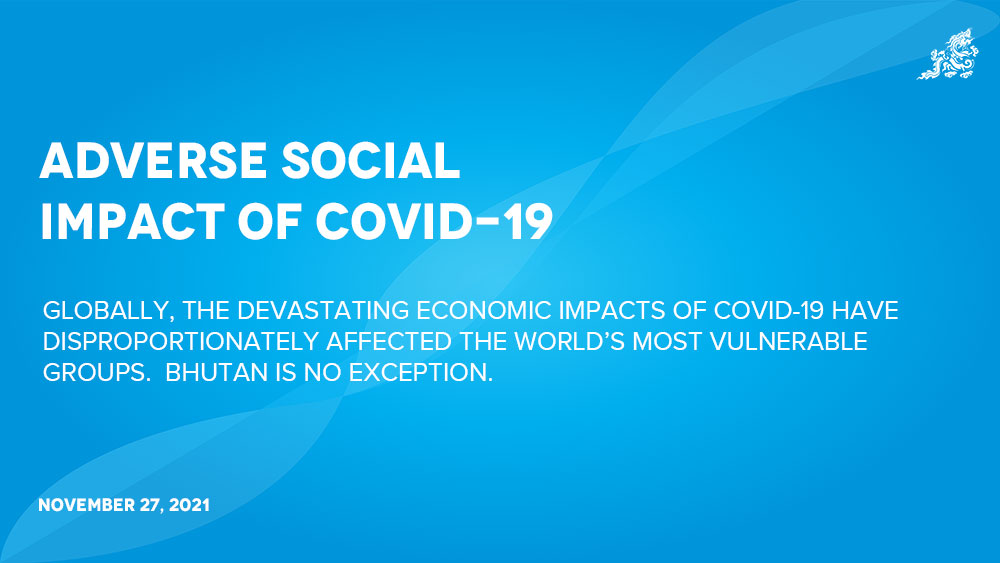Phub Dem | Paro
Globally, the devastating economic impacts of Covid-19 have disproportionately affected the world’s most vulnerable groups. Bhutan is no exception.
Data gathered from 20 dzongkhags and four thromdes showed that the pandemic has taken a toll on employment and livelihood resources, access to health, education, and other essential services. It revealed an increase in unpaid work, school dropouts, more domestic violence cases, and worsened mental health issues.
The National Commission for Women and Children’s impact assessment of Covid-19 on women and children shows that around 19 percent of households reported a loss of income from jobs or businesses. At least 59 percent said that their household income had been less than usual after the pandemic outbreak. The impact has been severe on rural households.
Around five percent of the households reported having at least one member losing a job or being laid off.

As those working in tourism and entertainment sectors were affected the most, up to 17 percent of the adults ventured into farming, rearing animals, or general farming activities as a coping mechanism. Around four percent of adults ventured into a family business, and 2.1 percent found a new job.
The findings revealed that the number of hours devoted to unpaid care and domestic activities increased for both men and women (and girls and boys) during the pandemic, with a slightly higher proportion of women and girls reporting the increase than men and boys.
As per the assessment, the pandemic strongly reinforced traditional social and cultural gender norms where women and girl children are expected to do unpaid household chores. At the same time, men and boys attend to outside work. Therefore, women were found spending more time on unpaid care work than men. The study found that women felt an essential part of their day was spent meeting the expectations of their domestic roles. “For urban women, it is an addition to their paid activities, creating a ‘double burden’ of work for them.”
Access to education
Although the study found that access to health and other essential services was good, many reported difficulties due to school closure, particularly in rural areas. Some of the challenges with online learning and self-study methods were limited access to the internet and affordability of data packages and devices such as smartphones.
Three percent of households reported that at least one child dropped out of school. While boys dropped out of school due to non-affordability of data packages, devices, and relocation of schools, girls dropped out due to academic pressure, difficulty in adapting to online classes, economic situations, and teenage pregnancy.
According to the assessment, most reported school closure adversely affected their well-being. The findings also revealed that limited access to outdoor activities and little interaction with family and friends disrupted their eating and sleeping habits and increased anger and frustration among children and adults.
Besides this, more than half of children engaged in paid work to supplement their family income and meet their expenses during the pandemic.
Children residing in rural areas spent more time helping family members with household work and less time studying than urban children.
The assessment states that learning became burdensome for parents who could not afford mobile phones and data charges.
According to sources, one of the significant impacts children faced was the closure of schools and disruption of regular teaching and learning for almost 180,000 children. As per records, a total of 9,188 preschool children with early learning needs faced difficulties in terms of home-based early learning programmes across the country. Altogether about 74,726 school children missed out on regular school feeding in 2020.
The relocation of students from high-risk areas was challenging, as children were unhappy and did not want to go to other schools. Many children reportedly found it extremely difficult to adapt and catch up with the syllabus even after relocation. “Some children who moved to a private school in containment mode said that relocation posed an extra economic burden to their parents.”
It revealed that 210 students from Classes X and XII did not return to school after the lockdown. The reasons include illness, fear of contracting Covid-19, finding jobs, and repeating the next academic session.
Recommendations
The impact assessment recommended that the Ministry of Labour strengthen the programmes and capacities of the training institutes and CSOs to focus on various training, employment, and income-generating skills for those affected by the pandemic.
It recommended that the Ministry of Education enhance school-parent partnerships through parenting and counselling programs, and strengthen the current Education in Emergency strategies and guidelines, inclusive of social and economic determinants of school disruptions and discontinuity.
Further, it suggested the ministry to develop strategies to bridge the digital divide, especially among low-income households, to enhance online learning outcomes.
The assessment asks the NCWC to advocate and promote male participation in household chores and activities through awareness and sensitization programmes, and facilitate programs to reduce women’s burden of unpaid care work through investment in time-saving technologies, facilities, and community support systems.
Edited by Jigme Wangchuk


